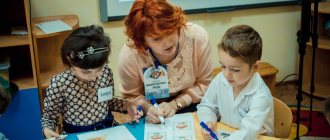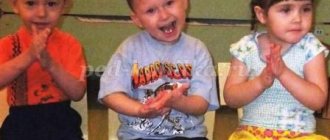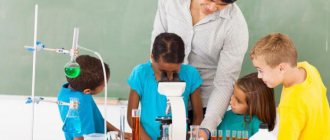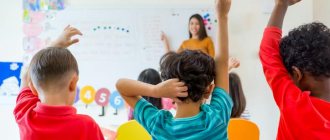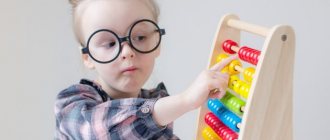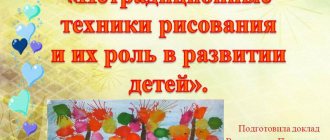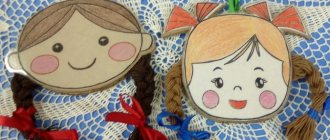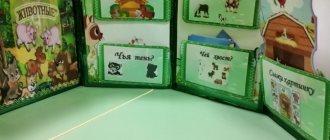How to choose a topic for self-education?
There are only two main criteria:
- requirement to study the topic from the outside (formulated in regulatory documents, in particular, in the Federal State Educational Standard for Preschool Education);
- the work of the teacher himself (lack of experience and knowledge to resolve a particular pedagogical situation).
Thus, before choosing a topic, you need to familiarize yourself with the regulatory framework for preschool education and analyze your own experience.
According to the Federal State Educational Standard, a preschool child develops in the following areas:
- social and communicative;
- educational;
- speech;
- artistic and aesthetic;
- physical.
Self-education of a teacher in accordance with the Federal State Educational Standard of Education
Definition 1
Self-education is the independent acquisition of new knowledge, as well as the acquisition of skills within the framework of one’s profession.
Self-education of a preschool teacher involves the need to solve the following series of problems:
- improve theoretical knowledge and pedagogical skills of all participants in educational activities;
- master new pedagogical technologies, forms and methods, methods of teaching and raising children, which ensures high quality education;
- study and introduce into practice advanced pedagogical experience, the latest achievements of pedagogical, psychological and other special sciences, new pedagogical technologies;
- develop innovative processes in preschool educational institutions;
- accumulate experience in conducting scientific, methodological and experimental work;
- organize the educational process, taking into account the development of technology and the current requirements of society.
Are you an expert in this subject area? We invite you to become the author of the Directory Working Conditions
Approximate topics of self-education for a preschool teacher according to the Federal State Educational Standard (2017 and later)
In accordance with the identified areas, topics on self-education for kindergarten teachers according to the Federal State Educational Standard can be as follows:
- Methods and means of amplification of preschool child development.
- Pedagogical diagnostics in a preschool institution.
- Individual approach in preschool education.
- Means and methods of developing safe life skills in preschoolers.
- Development of emotional intelligence in preschoolers.
- Guiding the play activities of preschool children.
- Cultivating kindness in preschoolers.
- Raising responsiveness in preschool children.
- Fostering sense of purpose in preschool children.
- Cultivating honesty and truthfulness in preschoolers.
- Formation of ideas about the small homeland among preschoolers.
- Development of creative abilities in preschool children.
- Formation of prerequisites for educational activities in children of senior preschool age.
- Cultivating curiosity in preschoolers (in classes, in communication, play, work).
- Formation in preschoolers of ideas about the signs, qualities and properties of objects in the surrounding world.
- Familiarization of preschoolers with the biocenosis of a forest (meadow, pond).
- Formation of ideas about space in preschoolers.
- Formation of ideas about inanimate nature in preschool children (natural phenomena, seasons, change of day and night).
- Formation in preschoolers of ideas about the shape, size, spatial relationships of objects.
- Formation of the concept of number in preschoolers.
- Development of forms of communication in preschoolers.
- Development of coherent speech in preschool children (in communication, play).
- Teaching children 4-7 years old basic analysis of a literary work.
- Teaching preschoolers to retell literary works.
- Teaching preschoolers to read poems expressively.
- Creative storytelling in kindergarten.
- Literacy training in preschool educational institutions.
- Non-traditional techniques of visual activity in kindergarten.
- Health-saving technologies in preschool education.
- Formation of cultural and hygienic skills in children of early and preschool age.
- Formation of self-service skills in preschoolers.
- Creating psychological comfort in a preschool group.
- Computer technologies in preschool education.
- Continuity of preschool and primary education.
- Psychological and pedagogical assistance in the family in the education and development of preschool children.
In 2021, changes and additions were made to the Federal State Educational Standard, in particular, on the education of children with disabilities. In this regard, one of the self-education topics for kindergarten teachers according to the Federal State Educational Standard 2021 could be:
- "Inclusive education in preschool settings."
In addition to topics in a specific area, you can choose a topic related to the work of a preschool institution as a whole:
- Planning work in a preschool institution according to the Federal State Educational Standard.
- Developing subject-spatial environment in preschool educational institutions.
- Development of partial preschool education programs.
- Innovative forms of working with parents of preschool children.
The list of topics on self-education for kindergarten teachers according to the Federal State Educational Standard 2021 may include the following topics:
- Variability of preschool education services at the present stage.
- Experimental activities in preschool educational institutions.
- Quality of preschool education: evaluation criteria.
- Social relations in preschool education.
Middle group. Junior preschool age. Children 4 - 5 years old
Self-education plan on the topic “Use of educational games for FEMP in children of primary preschool age” Self-education plan on the topic “Use of educational games for the formation of elementary mathematical concepts in children of primary preschool age.” Relevance of the chosen topic Mathematics should then be taught because it puts the mind in order. M. V. Lomonosov….
Work plan for self-development “Use of non-traditional drawing techniques with children of primary preschool age” Work plan for self-development for 2021-2022 . Theme of professional self-development of the teacher : “The use of non-traditional drawing techniques as a means of developing the creative abilities of children of primary preschool age.” Contents 1. Explanatory note 2 pages 2. Goals and objectives…
How to work by topic
Work on each of the listed topics begins with an analysis of the literature (an approximate list of sources is given below). When reading books, the teacher identifies the main thoughts, ideas, and judgments of the authors. So, taking up the topic of using didactic games to develop safe life skills in children, the teacher:
- draws attention to the peculiarities of organizing didactic games in different age groups;
- content of work on life safety in preschool educational institutions.
Then the teacher thinks through or also takes from books potentially dangerous situations that need to be avoided, and based on the knowledge gained, compiles a card index of games. He develops games himself or takes them from sources. Systematized materials are tested in practice.
MAGAZINE Preschooler.RF
CONSULTATION FOR PRESENTER EDUCATION TEACHERS “Organization of work on self-education of preschool teachers”One of the conditions for improving the quality of work of a preschool institution is the differentiated provision of assistance to teachers based on diagnostics of their professional level.
The task of the head of a school for a young specialist is to help a specific educator in solving those problems that cause him difficulty or are the subject of his interests. However, the effectiveness of work is ultimately determined by the independent work of the teacher and his self-education.
Work on self-education is one of the forms of increasing the professional competence of teachers, a way to achieve serious results and self-realization in the profession. This work is based on the following principles.
Self-education of a preschool teacher is multifaceted and multifaceted. The main directions in the self-education system for preschool teachers can be:
- Familiarization with new regulatory documents on issues of preschool education;
- Study of educational and scientific-methodological literature;
- Familiarization with new achievements in pedagogy, child psychology, anatomy, physiology;
- Study of new programs and pedagogical technologies;
- Familiarization with best practices of preschool institutions;
- Raising the general cultural level.
It is possible to assess the development needs of teachers using a number of questionnaires
(Annex 1).
It is desirable that the topic of self-education be related to the problems being solved in the preschool educational institution, with the priority direction of its activities. This allows you to solve two problems:
- The activities of teachers in the process of self-education will contribute to solving the problems of preschool educational institutions;
- Teachers will not need to scatter their efforts, solving separately the tasks of the preschool educational institution and the tasks of their own development, they will concentrate on one problem, and all teachers of the preschool educational institution will be able to benefit from the result of this activity in the future
Topics are also selected taking into account the individual experience and professional skills of the teacher.
The chosen topic of self-education should be close and understandable to the teacher; only in this case the result will be effective and will reveal the teacher’s creative potential.
If, for some reason, a teacher cannot independently formulate a problem or topic of self-education, it is necessary to use a special questionnaire to study his difficulties (Appendix 2).
Implementing a differentiated approach in determining the leading directions of professional development of teachers, we can recommend the following topics of self-education according to experience and teaching experience.
For young professionals:
- awareness of the values of a personality-oriented model of education, training and development;
- formation of the foundations of pedagogical skills;
- development of skills and constructive abilities.
For educators working for over 5 years:
- mastering methods of designing the educational process with the aim of increasing its efficiency and quality in the conditions of variable education;
- developing the ability to analyze scientific and methodological literature, applying acquired knowledge in practice, activating creative abilities.
For experienced, creatively working educators:
- development of abilities to redesign one’s own activities in the context of development trends in psychological and pedagogical science and the social order of society;
- manifestation of the teacher’s creative potential;
- promoting your achievements;
- development of research activities.
For teachers without special education:
- mastering methods of working with children;
- adaptation to teaching activities.
The topic of self-education can also be:
- one of the annual tasks of the preschool educational institution;
- a problem that causes difficulty for the teacher;
- replenishment of knowledge based on existing experience.
The success of a teacher in professional self-education directly depends on the support and assistance of a senior educator. Methodological work is necessary for the teacher:
- in defining the topic, goals and objectives;
- in planning work on self-education;
- during the implementation of the plan;
- in studying and analyzing the effectiveness of their work.
Issues of self-education are included in the topics of experimental activities.
After identifying the problem and topic of self-education, each teacher draws up a work plan. It indicates the problem, topic, defines the stages, and the content of the work at each of them. (Approximate self-education plan: Appendix 3). The expected result and forms of its presentation. The duration of the stages can vary depending on the complexity of the topic, its coverage in the theory and practice of preschool education, and the experience of the teacher himself. The timing of the implementation of the plan is determined by the teacher himself, but, as a rule, they are calculated from certification to certification.
Based on individual plans, a general work plan for self-education of preschool teachers is drawn up.
The effectiveness of the stages of self-education:
- Stage 1 – organizational and familiarization. Includes a detailed study of the situation on the selected problem, relevant scientific and methodological literature, determining the topic of self-education, drawing up a work plan, and preparing practical material. Forms for presenting the results of work: consultations, reports, visual and illustrative materials, long-term plans, lesson notes, programs.
- Stage 2 – the main one. Involves the implementation of prepared material into work. Form for presenting work results: holding events on the topic of self-education.
- Stage 3 – final. Involves carrying out diagnostics in order to track the results of work, self-analysis of teaching activities.
At the end of each stage, reflection (self-analysis) is carried out.
Formation of certain personal qualities:
- Teacher activity. Evaluated by the degree of his participation in pedagogical readings, consultations, pedagogical councils, and seminars on the topic of self-education. It can be noted that, subject to an informal approach to self-education, the activity of the teacher increases sharply. The new knowledge that the teacher finds creates the need to share it with other participants in the pedagogical process.
- Initiative. It manifests itself in the proposals with which the teacher comes up with to solve the problems of self-education. The growth of initiative begins after the teacher acquires a certain theoretical level, which stimulates his need to put the acquired knowledge into practice.
- Readiness for analytical work. This quality is necessary in order to correctly diagnose the development of children, analyze specific pedagogical situations, study and generalize one’s teaching experience, and determine the effectiveness of one’s own activities.
- The need for self-development. It manifests itself in the teacher’s desire to engage in search, research and experimental work, creative search (the assessment of the teacher’s implementation of the need for development is carried out according to the method of K.Yu. Belaya according to three criteria: active development, undeveloped development, stopped development).
Increasing the professional status of a teacher:
- Upgrade or confirmation of category.
- Forms of teacher success (recognition by administration, parents, colleagues).
Modern requirements for certification and preparation of a teacher’s portfolio require confirmation of his participation in various methodological events on the topic of self-education.
Thus, the proposed system of work on self-education, firstly, confronts each teacher with the need to improve their theoretical and practical knowledge, skills and abilities, and secondly, it allows taking into account the collective experience gained by more than one generation of teachers, thirdly , helps teachers to constantly be in a certain “professional tone” , which allows them to initiate and create an atmosphere of professionalism and creativity.
A reminder for self-analysis
- Has the self-education plan justified itself? How was it combined with the tasks of the preschool educational institution and the individual topic of self-education? How are the main questions taken for study during self-education formed? Was there any research work planned?
- Whose teaching experience and on what issues was studied in accordance with the individual topic of self-education? Stages of material development. What literature was studied: psychological, pedagogical, scientific, etc.
- Practical conclusions after studying each topic.
- Creative collaboration (with a methodologist, narrow specialists, other teachers).
- A list of questions that turned out to be difficult in the process of studying literature and work experience. Setting new tasks.
Information for tracking teacher performance:
- Information about self-education - individual plans of teachers indicating the topic, problem of self-education, specific forms of reporting.
- Information about the participation of the teacher in methodological work.
- Information about awards, incentives, financial incentives, indicating the reasons for the incentive.
- Information about advanced training of employees.
- Information about employee certification.
- Results of assessing teachers' needs for self-development.
Literature:
1. Lvova L.T. Organization of work on self-education of teachers of preschool educational institutions\ Directory of senior educators. No. 11, 2008.
Internet resources:
- http: //doshvozrast. ru/metodich/konsultac05. htm
- http://festival. 1st September. ru/articles/417088/ (Self-education of teachers as one of the factors in improving the quality of work with preschoolers. (Bolta Galina Nikolaevna).
Annex 1
Assessing the implementation of teachers' development needs
Questionnaire No. 1 – to identify teachers’ ability to develop
When answering the survey questions, please put a point next to each number:
5 – if this statement fully corresponds to your opinion;
4 – more likely to correspond than not;
3 – both yes and no;
2 – rather does not correspond;
1 – does not correspond.
- I strive to study myself.
- I leave time for development, no matter how busy I am.
- Obstacles that arise stimulate my activity.
- I seek feedback because it helps me learn and evaluate myself.
- I reflect on my activities, setting aside special time for this.
- I analyze my feelings and experiences.
- I read a lot.
- I discuss widely on issues that interest me.
- I believe in my capabilities.
- I strive to be a more open person.
- I am aware of the influence that the people around me have on me.
- I manage my professional development and get positive results.
- I enjoy learning new things.
- Increasing responsibility does not frighten me.
- I would be positive about promotion.
Questionnaire No. 2 - to identify factors stimulating
and hindering the development of teachers.
Please rate the following factors on a five-point scale:
5 – yes (prevent or stimulate);
4 – more likely yes than no;
3 – both yes and no;
2 – probably not;
1 – no.
Obstacles:
- Own inertia.
- Frustration due to previous failures.
- Lack of support and assistance in this matter from managers.
- Hostility of others (envy, jealousy, etc.).
- Health status.
- Lack of time.
- Limited resources, cramped life circumstances.
Stimulating factors:
- Methodological work in preschool educational institutions.
- Training courses.
- Example and influence of colleagues.
- Example and influence of leaders.
- Organization of labor in preschool educational institutions.
- Attention to this problem of managers.
- Confidence.
- Novelty of activity, working conditions and the possibility of experimentation.
- Self-education classes.
- Interest in work.
- Increasing responsibility.
- Opportunity to gain recognition within a team.
Processing of questionnaires
Calculate the total points for the first questionnaire.
If you have scored 55 or more points, you are actively fulfilling your needs for self-development.
Having scored from 36 to 54 points, you will have to admit that you do not have an established development system.
Having scored from 15 to 35 points, you should understand that you are in a stage of arrested development.
The data is entered into a table.
The total points for the second questionnaire are also entered into the table.
Development coefficient (K) is calculated by the formula:
K = K (actual): K (maximum),
where: K (actual) – the total number of points given in the questionnaires,
K (maximum) – the maximum possible number of points in the questionnaires.
Enter the data into the table:
Teacher training, development and self-development
Appendix 5
Project “Modern Educator”
Project goal: Organization of methodological work in preschool educational institutions to improve the independent work skills of teachers in self-education.
Tasks:
- To support the interest of teachers in independently solving specific problems of the development of preschool children, in research activities through the study of methodological literature.
- Develop the ability to analyze the results of observations, experiments, and model ways of corrective and developmental work with children.
- To promote the disclosure of the creative potential of teachers, the organization of their scientific and methodological activities.
Estimated results of the project:
- This project is aimed at developing the following skills in teachers:
- Ability to set goals, objectives, plan work
- Ability to work with educational, reference, scientific and methodological literature (selection of necessary literature, analysis of what has been read, writing notes, theses, etc.)
- The ability to highlight the main, key concepts in any information material, draw up supporting diagrams, plans, etc.
- The ability to systematize, group studied facts and situations into semantic blocks, draw up graphs, diagrams, tables.
- The ability to express a reasoned judgment on a problem, to substantiate or refute judgments.
Duration of project activities: academic year
Ways to solve the tasks:
1. Create conditions for self-education of teachers:
- Constant acquisition of methodological literature;
- Increasing the number of subscription publications;
- Provide time in teachers’ work schedules for independent work with literature in the teaching room.
2. Select diagnostic and research materials for analyzing and assessing the development needs of teachers.
3. Include in the annual plan of the preschool educational institution activities that require teachers to collect information, analyze activities, study and solve problems, etc.
4. Consider the participation of teachers in open events of city creative associations (master classes, a panorama of advanced teaching experience, etc.), seminars for students of the Khakass Republican Institute for Advanced Training of Education Workers.
5. Draw up a long-term plan for project activities.
Project implementation mechanism:
Increasing the level of theoretical training and professional skills of teachers can be assessed through the following components:
- The level of mastery of program content by students, the formation of the necessary knowledge, skills and abilities (diagnostics of learning skills).
- Results of control: thematic, final, interview (the facts of teachers’ use of modern programs, technologies, various forms of organizing the educational process to enhance the cognitive activity of children, non-traditional methods of interaction, etc. are stated)
- Analysis of teachers' participation in methodological work.
- Evaluation of the teacher’s activities during open events, classes, etc.
- Certification.
It is planned to diagnose changes during the implementation of the project using the “Diagnostic Professionogram of Teachers’ Skills and Creativity.” The results are recorded in the “Proficiency Screen”.
Conclusion
An important point in working on the project is not so much summing up the work done, but rather determining its significance and necessity both for each teacher individually and for the educational institution as a whole. Therefore, the project work ends with two significant events: a reader’s conference and the business game “Auction of Ideas.” A brief plan for their implementation is given below.
Readers' conference
Goal: To help identify the public opinion of the team on current issues of preschool educational institutions and preschool education in general.
Subject of discussion: pedagogical books and articles that have aroused particular interest among teachers.
Exhibition design.
Event plan
Introductory theoretical part: “Introductory speech” (short, approximate):
A teacher learns all his life - this is a well-known truth. He is in constant development and has been a researcher throughout his working life. Scientific and methodological activities have a particularly great influence on the formation of professionalism. This activity involves:
- Constant familiarization with modern scientific research by scientists.
- Studying the progressive experience of colleagues.
- Familiarization with new programs and concepts of raising and educating children, their evaluation, etc.
Messages on books and articles read that aroused special interest among teachers.
Opinion exchange.
Acceptance and development of recommendations.
Business game “Auction of Ideas”
Goal: To expand teachers’ ideas about possible forms and methods of working with preschoolers.
Tasks:
- To support the interest of teachers in independently solving specific problems in the development of preschoolers.
- To develop the need of teachers for constant replenishment of pedagogical knowledge.
- Independent search by teachers for effective, priority methods for developmental and correctional work with children and parents.
Visibility: “Ideas Auction” poster, incentive tokens.
Homework:
Prepare materials from your own practice on organizing work with children based on modern programs and technologies.
Prepare a presentation of this material, answer the questions: What problem are you trying to solve? Why did this particular problem attract your attention? What is interesting about this material from your point of view?
The game is played in the form of an auction. The one who offered the highest “price” after presenting the material gives an explanation: why is this material valuable? Why is this material preferred?
Experts fix the “price” of each lot and determine the most “expensive”. The participant who collects the largest number of tokens will receive an incentive prize (book, teaching aid, etc.) at the end of the game.
Literature
- Belaya K.Yu. Innovative activities in preschool educational institutions: Method. allowance. – M.: TC Sfera, 2005 – 64 p. (Series “Library of the head of the preschool educational institution”)
- Losev P.N. Management of methodological work in a modern preschool educational institution. – M.: TC Sfera, 2005 – 160 s (Appendix to the magazine “Preschool Education Management”)
- Gorbacheva N.B., Rozhina G.A. Pedagogical Council: magazine “Child in Kindergarten” No. 6 – 2005, p. 30
- Kokotkina O. How to organize work on self-education: magazine “Preschool Education” No. 8 - 2004, p. 36
- Belaya K.Yu. 300 questions and answers for the head of a kindergarten / K.Yu. Belaya - M.: Astrel Publishing House LLC: AST Publishing House LLC, 2001 - 399 p.
- Myagchenkova L. Project activities in managing the development of the municipal education system: magazine “Preschool Education” No. 6 - 2003, p. 39
Memo “How to prepare for a report, speech”
I. Stage – preparation of a report, speech.
- Formulation of the topic, identification of the core problem and target setting, taking into account the interests and requests of listeners.
- Formulation of the main questions of the report, speech.
- Drawing up a detailed plan for the speech.
- Viewing and reading specialized literature.
Selection and systematization of visual materials.
Selection of pedagogical situations from your own experience and the experience of colleagues.
Determining the order of use of selected materials in the presentation process.
5. Distribution of material according to questions.
6. Written presentation of the full text of the speech.
II. Stage – working with prepared material
- Highlighting the main semantic parts in the text that need to be emphasized when speaking.
- Distribution of time for presenting each question and determining the tempo of the speech (test reading).
- “Collapse” of the full text of the report into a short form (thesis, plan, quotes on cards).
III. Stage – preparation for the performance
- Before you get involved in work, get ready: sit or stand comfortably, give yourself an attitude of internal composure, concentration, mentally imagine some pleasant scene, an incident from your own life.
- Before presenting information, give yourself the attitude that those around you are potential like-minded people.
Memo for teacher research work
I. How to correctly formulate a topic:
1. Formulation indicating the process under study and the conditions under which it is studied according to the scheme:
For example: “Development of observation skills in children of senior preschool age during walks in nature”
2. Formulation of the topic according to the schemes:
- SOMETHING as a condition for the development of SOMETHING
- SOMETHING as a means of forming SOMETHING
- Using SOMETHING as a means (condition) of development (formation, education, formation, etc.) of SOMETHING
For example:
“Plot-role-playing game as a means of developing the communicative abilities of preschool children”
“Observation as a means of developing voluntary attention in preschool children”
“The use of educational games as a means of developing cognitive abilities in children of senior preschool age”
II. Determining the relevance and novelty of the research
Answer the question: why does this problem need to be studied today, how important and significant is it for the practice of teaching and educating preschoolers?
The relevance lies in the explanation of the theoretical orientation that will be achieved as a result of the work.
Novelty may lie in a new solution to issues and affect regional characteristics.
III. Formulating the purpose of the study
A goal is what needs to be achieved or shown as a result of work; it is an idea of the overall result of the work.
For example: the topic “Educational games as a means of developing the cognitive abilities of preschool children”
Purpose: To show the role and importance of educational games in the formation of the cognitive abilities of preschool children.
IV. Formulation of research objectives
Answer the question, what needs to be done to confirm the assumption?
Problem formulation scheme
Municipal autonomous preschool educational institution Kindergarten No. 18
The consultation was developed and conducted by: teacher, head of the “School of Young Specialists” Shreiner T.E. Chelyabinsk
2015
| Next > |
Requirements for the preparation of documentation for self-education
Self-education documentation should be filed in a binder and divided into the following sections:
- A title page that should indicate:
- full name of the educational institution;
self-education materials;
- Full name of the teacher, his qualification category;
- the topic of self-education.
- Content;
- Topic, purpose of the work and main tasks that must be solved in the process of self-education activities;
- Expected results;
- Work plan drawn up for the academic year;
- Implementation of acquired knowledge in practice. Teachers can do this in the following ways:
- holding an open lesson;
preparation and holding of the seminar;
- conducting a master class for teachers on a chosen topic;
- design of a moving folder;
- compiling a collection of advice for parents, etc.
- Bibliography
